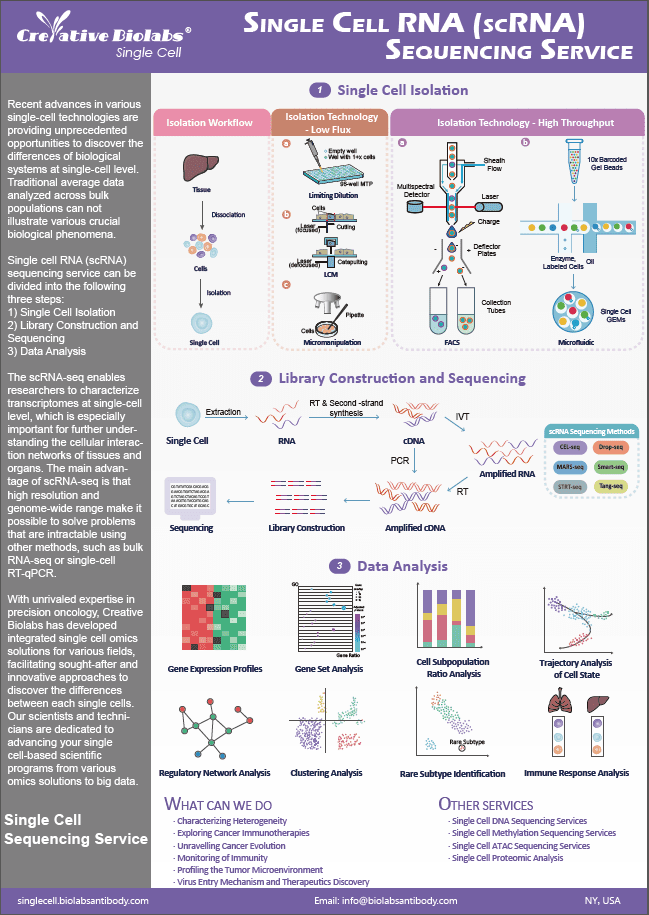Single Cell Metabolomics Platform
Cellular metabolomics is an important reference for assessing phenotypic heterogeneity. When the living environment of a cell population changes drastically, the difference between different cell individuals will be the key to determining cell fate. At present, the theory and application of metabolomics at the single-cell level are gradually improved. Creative Biolabs has established a relatively mature platform for single-cell metabolomics technology, which is expected to achieve more complete metabolome coverage, better and faster identification of metabolites and improvement of nondestructive testing.
Single Metabolomics
In recent years, the potential of single-cell omics in the diagnosis and treatment of diseases has begun to attract attention, and the number of research topics and medical projects related to single-cell genomics, transcriptome, proteomics, and metabolomics has increased significantly. A metabolome is defined as a set of small molecule metabolites found in a particular cell, organ or organism. Due to the highly dynamic nature of cellular metabolism, single-cell metabolomics can be used to discover chemical strategies by which cells respond to chemical or environmental stresses. Compared to other single-cell omics, metabolomics describes cell function more directly and dynamically, but this is undoubtedly the most difficult to measure. This is because the metabolites have a large structural diversity, a wide dynamic range, the inability to amplify metabolites, and the use of fluorescent labels may distort their normal function, allow dynamic response to the environment in a short period of time.
Single Cell Metabolomics Analysis Technologies
To test individual cell responses to stimuli or environmental stress, Single Cell provides an important reference for customer research projects by accurately analyzing cell conditions and comparing these data with the metabolomics database. Our analytical methods for identifying single cell metabolites are as follows:
- Mass spectrometry (MS) - Our MS assays are unlabeled, highly sensitive and informative, and are one of the most widely used methods for ultra-sensitive detection of many metabolites at single-cell level.
- Mass spectrometry imaging (MSI) - MSI is capable of detecting and identifying a broad range of metabolites and is often applied to tissue sections, where a cell-by-cell distinction is feasible.
- Fluorescence-based detection - Fluorescence microscopy is an excellent, sensitive, non-destructive, widely used method for imaging single cells that is typically used in conjunction with fluorescent labels to provide chemically specific parameters. With modern image processing, information can be accessed directly in a high throughput manner.
- Vibrational spectroscopy - Vibrational spectroscopy can be used to distinguish certain metabolites in single cells. As opposed to detection through fluorescent tags, vibrational spectroscopy is label-free and thus amenable to spectroscopically active compounds (e.g., pigments) as long as they are present in sufficiently high concentration.
To explore more about our single cell solutions, please feel free to contact us by email or send us an inquiry to find an end-to-end solution.
Features & Benefits
-
High-Resolution Metabolic Profiling
The platform offers high-resolution profiling of metabolites at the single-cell level, enabling detailed analysis of cellular metabolism.
-
Mass Spectrometry Integration
Integrates advanced mass spectrometry techniques, such as MALDI and nano-DESI. These techniques provide sensitive and accurate detection of a wide range of metabolites, enhancing the depth and quality of metabolic data obtained from single cells.
-
Spatial Metabolomics Capability
Supports spatial metabolomics to map metabolite distributions within tissue sections. This feature helps researchers understand the spatial organization of metabolites and their roles in cellular microenvironments, critical for studying complex tissues and tumor microenvironments.
-
High-Throughput Analysis
Capable of high-throughput metabolomic analysis, processing numerous single cells simultaneously.This efficiency is essential for large-scale studies, reducing the time and cost associated with metabolic profiling and enabling comprehensive analyses of diverse cell populations.
-
Real-Time Metabolite Monitoring
Allows for real-time monitoring of metabolic changes in single cells. Real-time analysis helps in understanding dynamic metabolic processes and their responses to environmental changes or treatments, which is crucial for drug development and therapeutic interventions
Q&As
Q: How does the Single Cell Metabolomics Platform work?
A: The platform integrates microfluidics and mass spectrometry to isolate and analyze metabolites from single cells. This combination ensures precise measurement of metabolic profiles, enabling the detection of a wide range of metabolites with high sensitivity and specificity.
Q: How does Single Cell Metabolomics benefit drug development?
A: By providing detailed metabolic profiles of individual cells, this platform helps identify how cells respond to drug treatments at a metabolic level. It can reveal mechanisms of drug action and resistance, guiding the development of more effective and targeted therapies.
Q: How does the platform handle high-throughput analysis?
A: The platform is designed for high-throughput analysis, allowing simultaneous processing of numerous single cells. This capability is crucial for large-scale studies, reducing the time and cost associated with metabolic profiling and enabling comprehensive analyses of diverse cell populations.
Q: How is real-time metabolite monitoring achieved?
A: The platform allows for real-time monitoring of metabolic changes in single cells using advanced mass spectrometry techniques. This feature is essential for studying dynamic metabolic processes and cellular responses to environmental changes or treatments in real-time.
Q: What role does microfluidics play in Single Cell Metabolomics?
A: Microfluidics allows for precise isolation and manipulation of single cells, enabling accurate metabolite extraction and analysis. This technology enhances the efficiency and resolution of metabolomic studies, ensuring high-quality data from individual cells.
Resources
Search...


